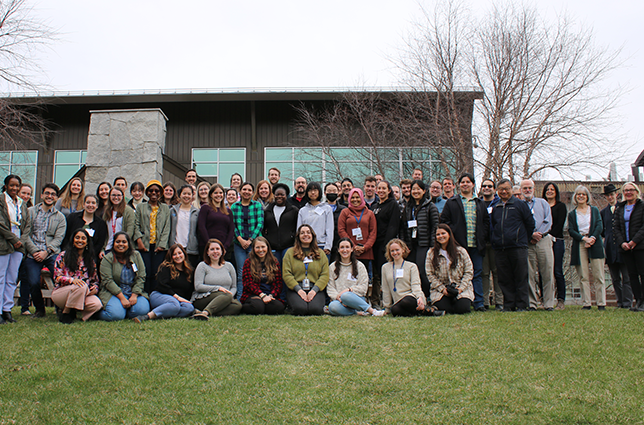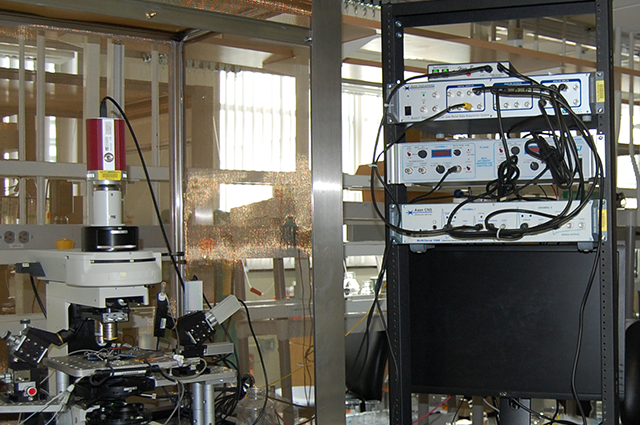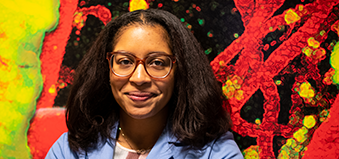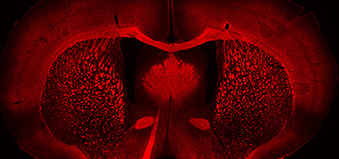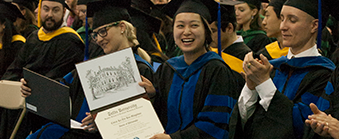Neuroscience
| Program Start | Length | Funding | Stipend |
|---|---|---|---|
SEPTEMBER | 5.5-6 YEARSon average | FULL TUITION | $45,0002025-2026 |
Launch Your Neuroscience Career
The Tufts PhD in Neuroscience offers rigorous, hands-on training in a collaborative, supportive environment. Students explore the nervous system from molecules to behavior, with strengths in synaptic function, glia-neuron interactions, and systems neuroscience. The program emphasizes individualized training, one-on-one mentorship, and interdisciplinary research, including opportunities through our Neuro at JAX partnership with The Jackson Laboratory. Those not yet ready for a PhD can apply to the MS in Biomedical Research with a neuroscience focus.


A Curriculum Built for Impact
Our research-centered curriculum provides comprehensive, hands-on preparation for a successful research career across academia, industry, and science policy. Through coursework, faculty-led tutorials, journal clubs, and seminars, students develop scientific rigor, critical thinking, and communication skills. From experimental design to data analysis, the program equips students to make meaningful scientific contributions throughout their careers.
Technique-Focused from Day One
Early and comprehensive training in experimental techniques and data analysis is a cornerstone of the Tufts Neuroscience PhD experience. Our dedicated techniques course, developed with the Center for Neuroscience Research (CNR) and supported by state-of-the-art facilities, enables students to master modern neuroscience tools—accelerating their lab progress and sharpening their edge for future postdoctoral or industry roles.


Mentorship-Driven Training in a Collaborative Neuroscience Community
At Tufts, students build lasting mentorship relationships through one-on-one guidance and individualized training plans tailored to their scientific interests and career goals. Our close-knit, supportive community fosters collaboration over competition, encouraging open idea exchange and diverse perspectives. This mentorship-first culture prepares students to excel as scientists and valued colleagues within a dynamic, interdisciplinary environment.
Interdisciplinary Neuroscience Research & Expert Faculty
The Tufts Neuroscience PhD program integrates expertise from the Schools of Medicine, Arts & Sciences, and Veterinary Medicine. Students access diverse faculty, including adjunct faculty, spanning molecular to systems neuroscience, with broad research resources and collaborative opportunities. Through our Neuro at JAX partnership, students also train with experts at The Jackson Laboratory in Maine—preparing them for successful careers in academia, biotech, and beyond.
Real Research, Real Results
Our students publish in leading journals, present at national conferences, and collaborate across labs. With strong support from faculty and peers, students conduct groundbreaking thesis projects in areas such as synapse biology, glial function, neural development, and systems neuroscience. Over 90% of our graduates complete their PhDs and go on to successful careers in academia, biotech, pharma, government, and science communication.
Neuro @ JAX: Expand Your Training at a World-Renowned Research Institute
The Neuro at JAX track offers a unique opportunity to train at The Jackson Laboratory in Bar Harbor, Maine—a world leader in genetics and neuroscience research. Students in this track complete all requirements for a Tufts PhD while conducting research at JAX, gaining access to a second network of distinguished faculty, advanced tools, and high-impact projects.

Apply Now to Join Tufts Neuroscience PhD Program
Prospective students apply through the Graduate School of Biomedical Sciences (GSBS) online application system. A strong background in cellular and molecular biology, biochemistry, and neuroscience is recommended. If you are interested in the Neuro at JAX program, please note that a separate application is required.
Program Highlights
Annual Neuroscience Retreat
Each year, our students, faculty, and staff gather for the Neuroscience Retreat—an energizing event that fosters scientific exchange, community building, and professional development in a relaxed, collegial setting.
Access to Specialized Research Facilities
Our students have access to advanced equipment and shared research spaces to support their experimental work. Use of these resources is managed through a simple reservation system, ensuring availability and efficiency for all trainees.
Meet Our Students
Our students come from across the US and the world and are pursuing a wide range of thesis projects.
Student Publications
Publication of research is a key part of training and our students publish their work in excellent journals.
Program Outcomes
Over 90% of our students complete an advanced degree and go on to pursue a wide range of careers.
Contact Information
Leon Reijmers, PhD
Program Director
Rob Jackson, PhD
Admissions Director
Shelley Scheier
Program Coordinator
